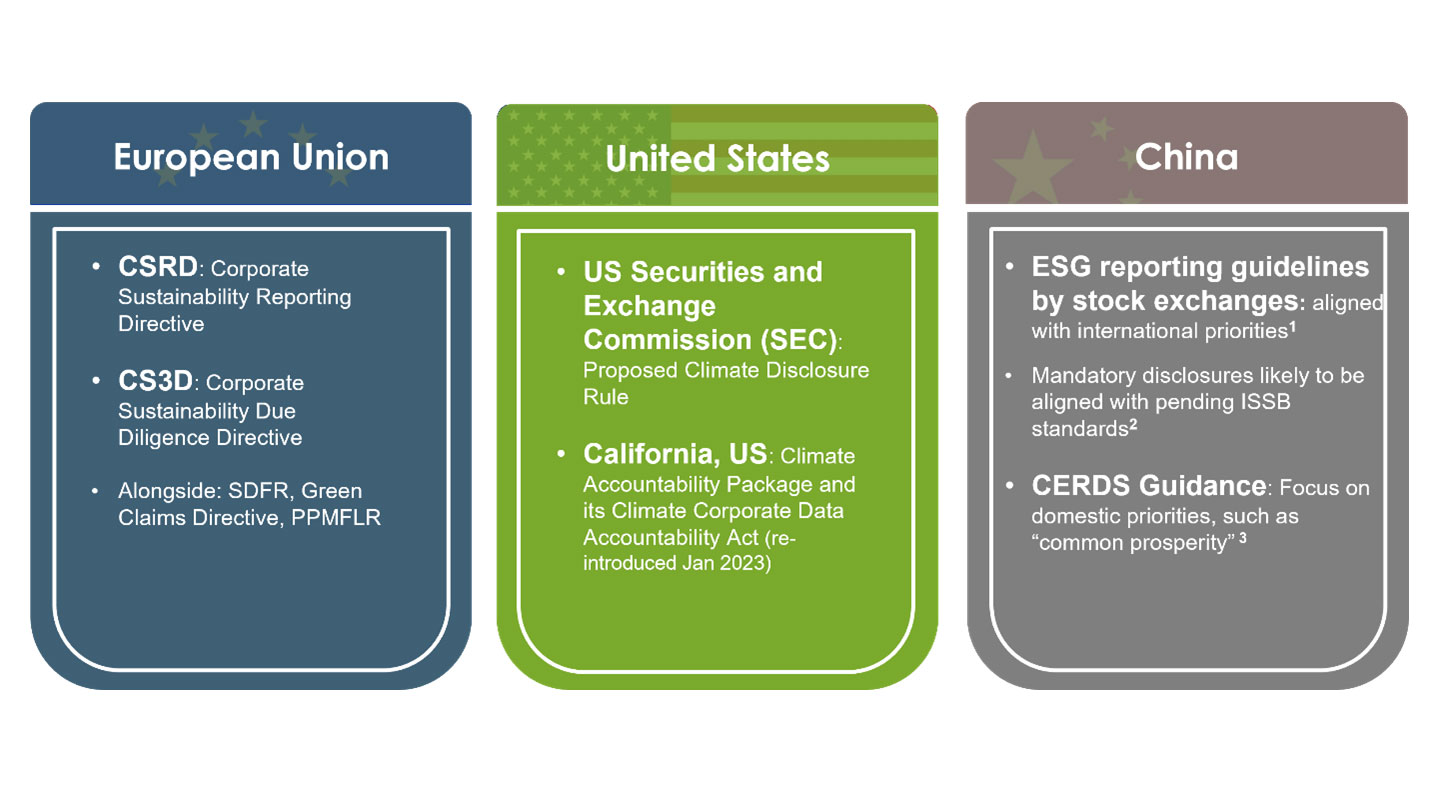The Evolving Sustainability Reporting Landscape from an ITAD Perspective
The sustainability reporting landscape is constantly evolving, with growing global concern about environmental issues, more companies are recognizing the importance of measuring and reporting on their sustainability efforts. ITAD providers are uniquely positioned to assist in this effort, as they specialize in managing the disposition of retired IT assets, which can have a significant impact on a company’s environmental footprint. As such, ITAD providers are taking on a more active role in sustainability reporting, helping companies to accurately measure and report on their environmental impact. This responsibility is likely to increase as sustainability disclosure reporting becomes a legal requirement.
Sustainability disclosures are becoming more common globally, with approximately 70% of countries having mandatory or voluntary ESG reporting instruments. Among them, 118 include eWaste as a keyword[1]. It’s promising that 79% of companies globally disclose sustainability information, and 47% of them currently seek external assurance[2].
Several significant regulatory and guidance initiatives are in progress in large economies;

The Corporate Sustainability and Responsibility Directive (CSRD) is already seen as many as a ‘game changer’. The legislation by the European Union (EU) is aimed at increasing transparency and better comparability by introducing updated sustainability reporting requirements for companies operating within the EU. The CSRD aims to align corporate reporting with the EU’s 2030 Agenda for Sustainable Development and the Paris Agreement on climate change.
The directive requires companies to report on their environmental, social, and governance (ESG) impact, including greenhouse gas emissions, resource use, and human rights. The legislation will initially apply to large, listed companies, then large non-listed companies, followed by some medium sized and third-country companies with significant presence in the EU market. The CSRD comes into effect in 2024 and will have a significant impact on their reporting obligations.
Data is key theme that runs throughout the CSRD, this data is intended to provide stakeholders with a better understanding of a company’s sustainability performance and help to identify areas for improvement. Additionally, the regulation requires companies to use standardized reporting frameworks to ensure consistency and comparability of data.
Transparency in CSRD is essential as it helps stakeholders, including investors, customers, and employees, to hold companies accountable for their actions. Transparent practices can also help build trust between companies and their stakeholders, leading to better relationships and a positive impact on a company’s reputation. By providing clear and concise information on their sustainable practices, companies can also identify areas for improvement and set targets to achieve sustainability goals.
To improve disclosure of primary environmental data, supply chain engagement will be essential. It has been estimated that up to 50,000 companies could be required to disclose under CSRD[1]. This will involve working with suppliers to obtain data on their environmental impact, such as carbon emissions or water usage. Through this collaboration, companies can gain a better understanding of their supply chain.
Sims Lifecycle Services (SLS) is prepared and our reporting ambitions align to those of the incoming legislation. Our parent company, Sims Limited, has been making TCFD (Task Force on Climate-Related Financial Disclosures) disclosures on climate related financial risks and opportunities since 2021 and have complete a materiality refresh of our material impacts aligning with the double materiality principle of the CSRD. You can read more about our sustainability reporting suite and our ESG journey here.
We know that Scope 3 emissions can account for a significant portion of a company’s overall carbon footprint, and reporting on them can provide valuable insights into areas where emissions reductions can be made. SLS is working with our supply chain to enable disclosure of even more primary environmental data, especially engaging with our global downstream vendors and subcontractor.
To support our client’s changing disclosure requirements SLS is supporting the transition from spend-based reporting to more accurate activity-based reporting, particularly when looking at service footprint and logistics reporting to our clients. Understanding our process and ancillary energy usage provides insights to our clients for Scope 3 and avoided emissions disclosures. SLS provides quarterly reports to our clients, detailing carbon emissions avoided through their current ITAD program. Calculations include assets that have been reused and recycled. To read more about client sustainability reporting please visit our website.
CSRD is one of several mature legislative developments in this evolving regulatory landscape. This evolution will lead to more accurate and comprehensive reporting on environmental impact, ultimately helping companies to reduce their environmental footprint and operate more sustainably. ITAD companies need to be prepared for incoming disclosure requirements and be ready to report appropriately and provide our customers with the information they need to make their own disclosures.
[1] Carrots and Sticks, ESG reporting instruments worldwide, May 2023
[2] KPMG Survey of Sustainability Reporting 2022, KPMG International, September 2022 – N100 sample
[3] https://www.refinitiv.com/perspectives/regulation-risk-compliance/how-many-non-eu-companies-are-required-to-report-under-eu-sustainability-rules/
